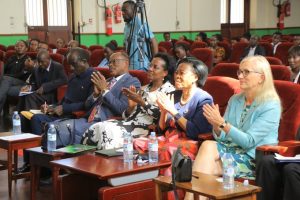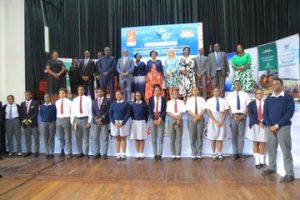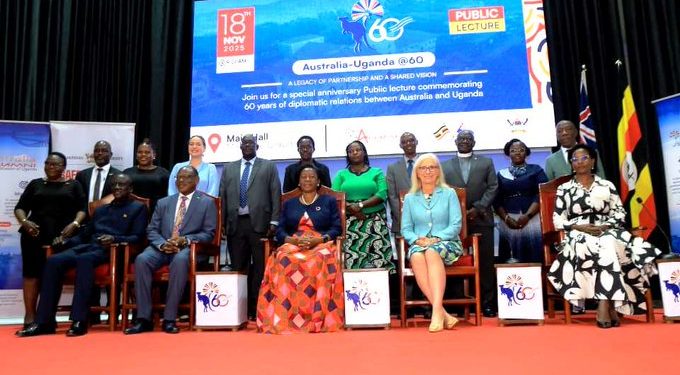Makerere University on Tuesday hosted a historic Commemorative Lecture and Exhibition to celebrate 60 years of diplomatic relations between Uganda and Australia, a partnership anchored in education, research, trade, and development cooperation.
The event, organised by the Australian Alumni Association of Uganda (A3-U) in collaboration with Makerere University and the Australian High Commission, brought together diplomats, academics, government officials, alumni, students, and private-sector leaders under the theme: “Australia–Uganda at 60: A Legacy of Partnerships and a Shared Vision.”
A call to co-create the next 60 years
Makerere University Council Chairperson, Mrs Lorna Magara, described the anniversary as both a celebration and a challenge to shape future collaboration.
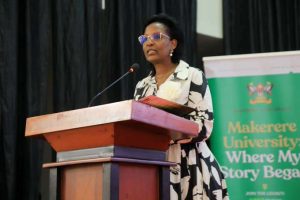
“This is not just a celebration of Australia–Uganda relations,” she said. “It is a call to co-create the next 60 years of engagement through innovation, shared prosperity, and stronger institutional partnerships.”
Australia’s Transformative Academic Support
Makerere University Vice Chancellor Prof. Barnabas Nawangwe highlighted Australia’s decades-long contribution to Ugandan academia through research collaboration and scholarship support.
“Hundreds of Ugandan scholars have built successful careers in academia, government, and industry through this partnership,” Prof. Nawangwe noted. “Makerere and Australian researchers are doing a great job searching for solutions to challenges affecting Uganda’s and global development.”
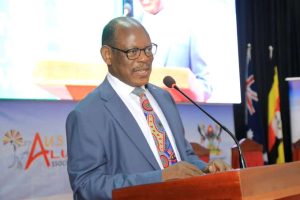
He also thanked the Australian Alumni Association for choosing Makerere as host and commended the presence of high-level diplomats.
‘We are building a future that is sustainable and equitable’
Australia’s High Commissioner to Uganda, H.E. Mrs Jenny Da Rin, delivered a comprehensive reflection on the evolution of Australia–Uganda ties, emphasising Australia’s long-standing support across education, agriculture, and research.
She noted that Australia contributes approximately AUD 30 million annually to various development programmes in Uganda through NGOs and multilateral institutions. “We have worked with partners such as the World Food Programme to enhance food security in the Karamoja region,” she said.
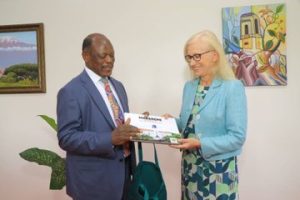
Through the Australian Centre for International Agricultural Research (ACIAR), she added, Australia has strengthened agricultural productivity, empowered women and youth, and supported technical and vocational skills development. ACIAR has also offered PhD opportunities to Ugandan researchers.
“I encourage our academic institutions to deepen this collaboration, leverage technology, and foster research that is practical and responsive to Uganda’s national priorities,” she said.
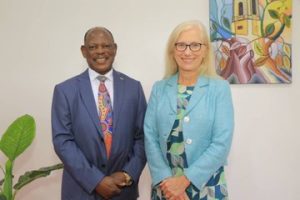
Education, she emphasised, remains a cornerstone of the partnership. “Through the Australia Awards Scholarships, we will continue supporting Ugandans to pursue postgraduate studies in areas that contribute directly to Uganda’s Vision 2040,” she affirmed.
Growing Trade, Investment, and Business Links
Looking ahead, the High Commissioner expressed optimism about expanding economic ties. Two-way trade currently stands at AUD 64 million, with room for growth.
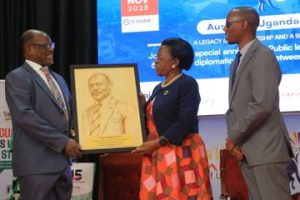
She highlighted rising Australian investments, especially in mining and oil: the Makuutu Rare Earths Project by Rwenzori Rare Metals, a subsidiary of Ionic Rare Earths (Australia); Worley, an Australian engineering company, holds the EPCM contract for the East African Crude Oil Pipeline (EACOP) and expanding interest in agriculture and tourism, including Intrepid Travel opening an office in Uganda.
She added: “Australian companies are global leaders in resource development and renowned for their environmental, social, and governance standards.”
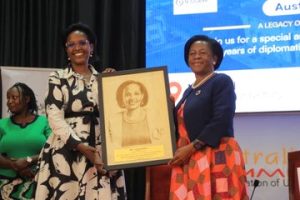
A Legacy of Alumni Impact
Thousands of Ugandan alumni of Australian institutions were celebrated for their contributions in leadership, public service, academia, civil society, and the private sector.
“Graduates of these programmes become part of a growing and dynamic network of professionals who help deepen our bilateral ties,” the High Commissioner said.
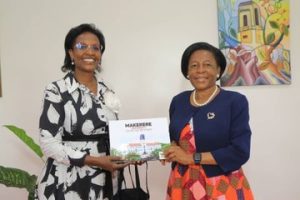
In her closing remarks, High Commissioner Da Rin reaffirmed Australia’s long-term commitment: “Australia wants to expand our innovation, knowledge, and collaborative partnerships; uphold our shared Commonwealth values; and ensure that the next generation inherits a world that is more sustainable, equitable, and peaceful.”
